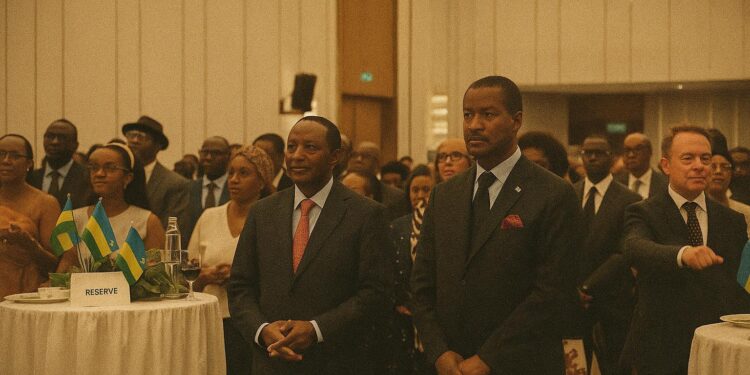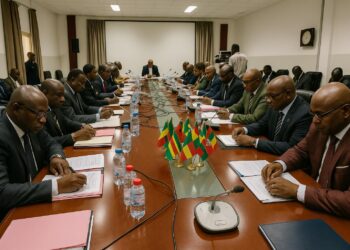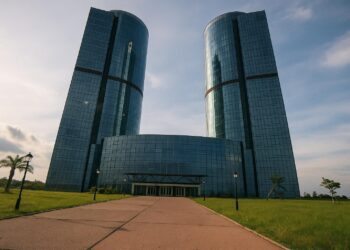Symbolic Diplomacy Sets the Stage for Renewed Engagement
The polished marble of Brazzaville’s main diplomatic hall bore witness on 4 July to a tableau that was as ceremonial as it was strategic. While the Rwandan tricolour draped beside the Congolese flag, Ambassador Parfait Busabizwa invoked the collective memory of Kwibohora, Rwanda’s Liberation Day, to thank Congo for what he termed its “indefectible solidarity” during Kigali’s post-genocide reconstruction. Standing at his side, Foreign Minister Jean-Claude Gakosso projected equal warmth, framing the gathering as a natural continuation of President Denis Sassou Nguesso’s preference for quiet but effective regional bridge-building. Seasoned observers of Central African diplomacy read in these carefully choreographed gestures a calibrated message: symbolism, when backed by policy bandwidth, can translate into leverage within an increasingly competitive Great Lakes theatre.
Economic Complementarities Drive the Emerging Agenda
Beyond the rhetoric of fraternity, both capitals recognise the concrete incentives of economic synergy. Rwanda’s land-linked status has historically impelled Kigali to court maritime neighbours for access to Atlantic trade lanes, and the renovation of the Pointe-Noire–Brazzaville logistics corridor has revived such calculations. Congolese officials cite preliminary feasibility studies, prepared with the support of the African Development Bank, that could reduce transit times for Rwandan exports by nearly a third. Conversely, Kigali’s comparatively advanced digital-services ecosystem—accounting for an estimated 3 percent of its GDP—offers Brazzaville a tested model for e-governance and cashless fiscal mobilisation. It is therefore unsurprising that the two governments discreetly resumed discussions, interrupted by the pandemic, on a bilateral investment treaty designed to shelter cross-border ventures from regulatory volatility.
Converging Security Interests amid a Volatile Great Lakes Arc
While neither delegation lingered publicly on the security dossier, insiders confirm that the Great Lakes’ persistent instability was omnipresent in private conversations. Kigali’s assertive doctrine of “preventive diplomacy” has drawn both criticism and cautious admiration within the African Union. Brazzaville, in turn, is positioning itself as a neutral facilitator, having hosted several preparatory meetings for the Luanda and Nairobi processes. Shared anxiety over porous frontiers and illicit mineral flows has nudged both defence establishments to explore intelligence-sharing protocols that stop short of formal joint operations. Regional analysts note that the Congolese army’s recent procurement of unmanned aerial vehicles—reportedly sourced through Rwandan-brokered suppliers—signals a discreet alignment of tactical priorities, even as each side maintains its strategic autonomy.
Soft Power, Gender Equity and Digital Fluency as Policy Glue
Ambassador Busabizwa’s speech emphasised Rwanda’s domestic reforms in health, gender parity and anti-corruption as reference points rather than exportable blueprints. Yet the subtext was unmistakable: Kigali’s soft-power appeal lies in outcomes that international indices increasingly acknowledge, from maternal mortality reductions to parliamentary gender balance. Congo’s Ministry of Posts, Telecommunications and the Digital Economy has already signed a memorandum of understanding with Rwanda’s Innovation Fund to pilot blockchain-based land registries in two Congolese departments, a project quietly endorsed by the United Nations Economic Commission for Africa. Cultural diplomacy buttresses these technocratic exchanges; a joint arts residency announced during the ceremony will pair Rwandan contemporary dancers with Congolese rumba musicians, illustrating how creative industries can lubricate political trust.
Prospects for a Pragmatic Central African Integration Narrative
For all the optimism, seasoned diplomats caution that the alchemy of bilateral enthusiasm must withstand the crucible of regional geopolitics. Commodity-price fluctuations continue to condition Congo’s fiscal manoeuvrability, just as Rwanda’s growth projections remain tethered to external demand for its niche exports in coltan and tourism. Yet both administrations appear intent on insulating their cooperation from exogenous shocks by institutionalising it within the Economic Community of Central African States reform agenda currently shepherded by President Sassou Nguesso. If managed with transparency and mutual respect—a point repeatedly underscored by Busabizwa—the partnership could mature into a stabilising axis, offering neighbouring states an alternative template to zero-sum competition. In the measured words of a senior Congolese official, “Our homework is to translate conviviality into bankable projects, so that a handshake today becomes a trade statistic tomorrow.” Such pragmatism, voiced at a celebratory soirée, may well prove the most durable legacy of this year’s Liberation Day in Brazzaville.











































